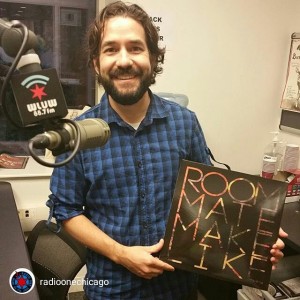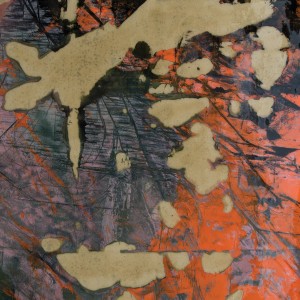Chicago band Roommate, led by Kent Lambert, came to our attention in the second half of 2015 thanks to a glowing review of their fourth album MAKE LIKE on review site Coke Machine Glow. Since then, it’s been blasted regularly in the Hidden Shoal offices, and has received an extensive review on the blog of Hidden Shoal’s Tim Clarke. After contacting Kent about the release, Tim conducted an illuminating interview with Kent via email.
TC: This year you released your fourth album as Roommate, MAKE LIKE. Listening back to your discography, there’s a clear evolution away from electronic sounds towards a more sophisticated, full-band sound. How do you feel about the album now it’s been out for a while, and how do you see it sitting in relation to the rest of your releases?
KL: I’m going to quote from my application for the Illinois Arts Council grant that helped fund the album’s release. I wrote this text almost a year ago. Keep in mind that I was trying to convince strangers to give me money, so I come off as more grandiose and less humble than I otherwise might:
“I consider the album to be a pinnacle of my own career as songwriter and music producer, and a definitive representation of the band’s transformation from intimate, lo-fi, solo affair to cohesive, creatively ambitious, organically collaborative band… More than any past Roommate album, MAKE LIKE is the result of a collaborative decision-making process, and its songs were arranged for live shows before being translated into recordings. As with past Roommate albums, I wrote all of its songs in solitude. Unlike with past Roommate albums, all of its instrumental arrangements, recording processes and mixing decisions were conducted collectively. Though this album is ultimately a collection of my songs and its production was directed and managed by me, it is a document of a band, of multiple distinct sensibilities converging and diverging to untap and maximise the songs’ emotional, sonic and kinetic potential.”
A year later, I’m going to quote from your review, it describes very well (and much more concisely) how I feel about the album: “a culmination of all that’s come before it – a distillation of an aesthetic and a refinement of purpose.”
TC: Can you tell me a bit about your songwriting process, perhaps giving a couple of examples of how some of the songs on Make Like evolved.
KL: From 2000 to 2013, I continuously wrote material that eventually became songs on various Roommate albums. Some songs came together very quickly, others existed as pieces and parts, phrases and ideas, for months or even years before they cohered into a complete song. The process was basically me carrying these parts around, in notebooks or in my head, and filtering the stimuli of my daily life into parts that might lock together with pre-existing parts. For example, the line “lodgepoles are all getting eaten alive” in ‘RIOT SIZE’ was something my dad said on a camping trip in 2008 (he was pointing at and describing swaths of forest that had been destroyed by mountain pine beetles). I kept that little piece in my head, along with something about a tiger, and then in 2011, in the midst of the Arab Spring and protests in Wisconsin over collective bargaining, the rest of that song came together within a few weeks, and those little lodgepole and tiger puzzle pieces found their place. By the time I wrote ‘PEOPLE ON SCREENS’ in January 2013, the rest of what would become MAKE LIKE had already been written, and I had a pretty good idea of how it would be sequenced, and of some of its overarching themes. I felt like there needed to be one more song. So I wrote most of ‘PEOPLE ON SCREENS’ in one sitting. I think it came together so quickly because it had all of these other songs to support and inform it.
TC: Your current line-up includes some pretty stellar players who also play in other Chicago bands. Do you have a clear idea of what you want the band to contribute to your songs, or do you let them create their own parts independently?
KL: It can vary from song to song, but our album arrangements are typically a mixture of parts I’ve come up with and parts that the other players figure out independently, or together as a band in rehearsals and recording sessions. The typical process is that I write the song and record a demo of it on my own, so that my bandmates can learn the song before we get together to arrange it for live shows. The demo will have placeholder drum, bass, synth and vocal parts, basically whatever comes to mind as I quickly try to sketch the song out. I am usually not attached to those parts and encourage my bandmates to replace them with new stuff, but in many cases they get very attached to the demos and sculpt their parts from those placeholder arrangements. On past albums, the demos would typically form the skeletons of the songs’ album versions, with my bandmates and I recording new parts around them (e.g. ‘MY BAD’ and ‘AUGUST SONG’ on Guilty Rainbow), but with MAKE LIKE, we arranged and played the songs live for a while before we worked on them in the studio. In the case of ‘OLD GOLDEN,’ the album arrangement is quite different from the original demo – that song evolved considerably through multiple live arrangements before settling into its album form. By contrast, ‘DANCER HOWL’ is much closer to the demo. The guitar figure that repeats through the verses and early ‘choruses’ is directly taken from the demo (although of course Sam fleshed it out with gorgeous tone and articulation) and we flew in the electronic drum parts from the demo and processed them through outboard gear.
TC: I find your lyrics and vocal delivery to be incredibly affecting. You manage to strike a difficult balance between the specific and the universal. I’m never exactly certain of what you’re singing about, but I understand what you mean – if that makes sense! At what point in the songwriting process do the lyrics take shape, and do you feel there are certain themes or ideas that recur in your songs?
KL: It’s extremely gratifying to get that feedback! What you say makes perfect sense to me, and though I’ve never articulated it that way, I’d say that striking that balance (between the specific and the universal, between cerebral ambiguity and emotional clarity) has been an underlying goal of my songs in recent years. I’m not interested in or comfortable with writing literal, confessional songs, but I’m also not interested in escaping into a fantasy or musical genre-fetish persona… I suppose I write songs as some kind of self-therapy. I meditate on my personal world and the social communities around it – my own creative communities, the city of Chicago, and beyond. The lyrics pretty much always come first. I might have some chord fragments or keyboard riffs floating around, waiting for lyrics to bond with, but it’s the lyrics that drive the process and turn the fragments into songs. I try not to analyse my own songs too intensely, I leave that to people like you, but yes, there are definitely themes and ideas that recur. My songs tend to come directly out of my anxieties, and those anxieties certainly have recurring themes. A prominent theme would be my anxiety with my own tremendous, ridiculous privilege as a comfortably employed white American man in the 21st century. I feel a burning itch to reckon with that privilege, to scratch at it, question it and atone for it somehow, I suppose. Other themes that I consciously reflected on while writing MAKE LIKE involved the kind of identity slippage facilitated by social media and immersive video games, the ease with which we can ‘connect’ with childhood friends, casual acquaintances and strangers through status updates and 3D avatars in violent virtual spaces, the beauty and horror that can live on the surface of those experiences, and the loneliness that often lies at their core… Or something like that?
TC: The production on MAKE LIKE is incredibly deep and rich. Can you talk about your relationship with Nick Broste and how you approached production on the album?
KL: We’d all known Nick for many years (he’s been a ubiquitous presence in Chicago’s music scene doing live sound and as a trombonist in Mucca Pazza and many other groups) but we’d never recorded with him. In 2012 we played a couple of shows at The Hideout for which he was running sound. We were very pleased with our stage mix and the feedback we got on how it sounded in the room. After one of those shows he told me that during ‘SECRET CLAW’ (a very new song at that point) he’d gotten very creative with the live mix, turning certain elements up and down and manipulating effects at various points in the song, and he sort of pitched the idea of helping us record a new album. We’d always self-produced with the incredible help of our good friend Gerard Barreto, but for a fourth album I was open to changing up the equation. I’d been fortunate enough to accumulate some complimentary recording days at John McEntire’s now-private SOMA Electronic Music Studios (my grandmother’s Mason & Hamlin piano was housed there for a couple of years), so Nick and I made some plans to do a bunch of tracking there. I think Nick was accustomed to a more straightforward recording process, wherein a band more or less documents their live show in the studio, followed by overdubs and mixing. We did a version of that by tracking basic rhythm section parts first, but for us, tracking and mixing are intertwined throughout the entire production process. Our process relies heavily on intuition, experimentation, trial and error – we’d listen to the evolving mixes to try to divine what else needed to be added. Once Nick got used to this process, he dove in headfirst and became a sort of mad sorcerer mastermind. He’d conduct all sorts of experiments with various outboard gear at SOMA (while talking to himself in various Spinal Tap-esque characters), he’d send tracks to tape or through his Memory Man pedal, he’d come up with counter-melodies (the Stereolab-like Farfisa part on ‘OLD GOLDEN’ was his creation) and strange textures… he basically became another member of the band. There were countless hours of tracking and mixing that just involved Nick and me.
TC: MAKE LIKE was mastered by Rashad Becker, who’s pretty legendary among those in the know, and who seems to have an exhaustive understanding of audio. How did you come to work with him? Have there been albums he’s worked on that you admire? What do you feel he brought to the album’s final incarnation?
KL: I don’t tend to pay too much attention to the technical personnel on albums I love, I typically just let my friends and collaborators educate me on such details. So I hadn’t heard of Rashad Becker until a conversation with my friend Cooper Battersby (he’s in CAVE and Bitchin’ Bajas and is an accomplished sound engineer and producer in his own right) when MAKE LIKE’s final mixes were on the horizon. Nick and I were a bit concerned with the robustness and density of the low-end in our mixes. Cooper was thrilled with Rashad’s work mastering CAVE’s album Threace, and he was confident that Rashad’s work on so many incredible bass-heavy electronic music records more than qualified him to help preserve the clarity of our mixes. I looked him up and realised he’d mastered many, many albums I listened to heavily in the aughts (e.g. Lali Puna’s Tridecoder and Scary World Theory, Morr Music’s Blue Skied An’ Clear complilation) and more recently (Fennesz’s Becs and Pantha Du Prince’s Black Noise), so I was determined to work with him, or at least to have someone at Dubplates & Mastering do the job. I think he did exactly what Cooper said he would – he applied a light but firm hand to the mixes, preserving and gently enhancing their clarity and dynamics. He kept the bass-y elements from becoming the muddy over-compressed mess that could have resulted from other engineers and facilities.
TC: When I first got in touch with you and asked about whether MAKE LIKE was going to be released on CD, this sparked a conversation about how frustrating it can be to continue making music when recouping costs has become close to impossible. How big a part does Roommate play in your life, and how do you see that changing in the future?
KL: I’ve worked various part-time and full-time jobs in the 15 years that Roommate has been a thing, and I’ve been active as an experimental videomaker, and played in other bands (the most recent and active of them being The Father Costume), so Roommate is one of many projects I’ve juggled in that time. But in terms of the sort of psychological/emotional/psychic presence it’s held in my life, it’s often felt like the central activity of my life, and there have been sustained periods of months during which it has more or less been a second full-time job, particularly during album production, mixing/mastering, release and touring cycles. I stopped writing new material after ‘PEOPLE ON SCREENS,’ I think I wanted those cycles to stop, at least for a while. I wanted a clean break – a break from new material to obsess over, from the costs and logistical headaches of studio recording, from the infinite decisions and minutiae involved in recording, mixing and mastering, and especially from the label/publicist/promotion/business side of it. I didn’t and don’t want to end the band, but I did make a conscious choice to stop participating in the traditional (and seemingly outmoded?) album release model that we and so many of our peers have used for years. That doesn’t mean I won’t record music again, but I am definitely not generating songs the way I did for so many continuous years.
So I really don’t know what role Roommate will play in my life in the future, but I’m keeping an open mind about it. In June we had a residency at our favorite Chicago venue The Hideout, which entailed a different show every week for five weeks, with different musicians and songs in each installment, and in the lead up to and during that residency, Roommate felt like two or three full-time jobs. But it was an intensely rewarding experience. It made old songs feel new again, and it involved so many different collaborators: the four-piece at the core of MAKE LIKE, numerous ‘alumni’ from past incarnations of the band, and a few incredible musicians with whom I’d never performed before. There was a program of music videos (including an interactive art-game by Thorne Brandt that will presumably be made public in 2016), a live score to 16mm films performed by Sam Wagster and me, and chamber ensemble versions of a few songs. I came out of the experience with a renewed confidence in the depth of the catalogue, and in the potential for the project to continue to mutate and reincarnate, even if there are no more proper albums for a while, or ever.
TC: As far as I’m concerned, 2015 has been an absolutely stellar year for music – including outstanding releases by Jenny Hval, Jim O’Rourke and Björk to name a few – with Roommate’s MAKE LIKE as my favourite of them all. Which records have you held close this past year?
KL: It’s amazing to me that our record would be in the company of, let alone top, those records you mentioned! It does really seem to have been a stellar year for music. I find it difficult to keep up with and fully appreciate music during its initial release cycle. For example, I listened to Dirty Projectors’ Swing Lo Magellan in 2012–13, but it wasn’t until this past summer that I really, really got into it, and 2015 was also the second year in a row that I listened to MGMT’s 2010 album Congratulations semi-obsessively… But that said, in 2015 I spent much time with and got a great deal out of the latest albums by D’Angelo, Holly Herndon, Joanna Newsom, Kendrick Lamar, Julia Holter, Dungen, Sufjan Stevens and Flying Saucer Attack, as well as the Björk and Jim O’Rourke records you mentioned (Jenny Hval is on my radar but I haven’t dug into her music yet) and an amazing work from a large ensemble called Never Enough Hope (it includes Nick Broste and a couple other Roommate alumni, Amy Cimini and Erica Dicker). The composer and leader of the group is Toby Summerfield and the album is called The Gravity of Our Commitment. It’s phenomenal.
TC: And finally, what’s with the digital handclap sound that keeps cropping up in MAKE LIKE?!
KL: I don’t know, we got a Yamaha drum-pad at some point during the production of the album, and a couple of its clap samples became as crucial to us as a shaker or tambourine. I definitely felt a craving for sort of ’80s science fiction movie atmospheres and textures to be strongly represented on this record, and the handclap sort of encapsulated the fulfillment of that craving, particularly at the ending of ‘WILDERNESS.’ A digital clap through some precisely calibrated delay effects, at particular subdivisions of the beat, is an exquisite thing!
Hidden Shoal would like to thank Kent for taking the time to chat with us. Roommate’s MAKE LIKE is available on vinyl, cassette and digital download via Strange Weather Records and Bandcamp.



